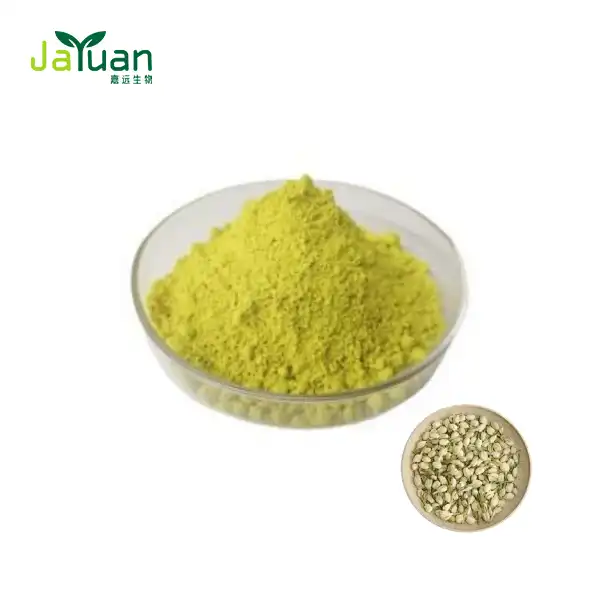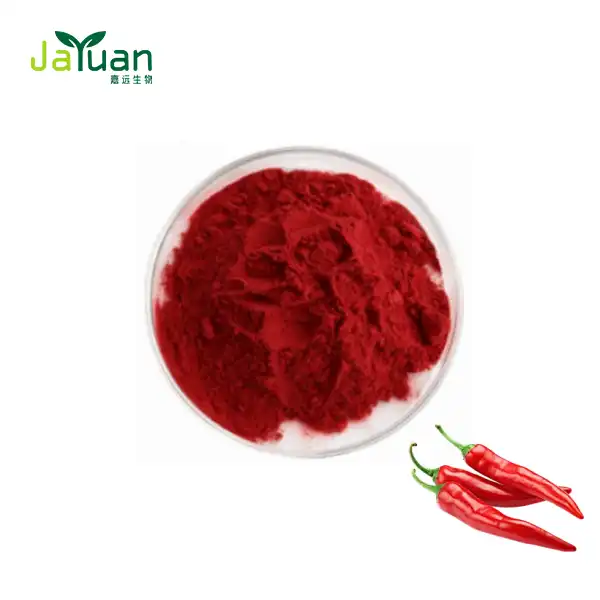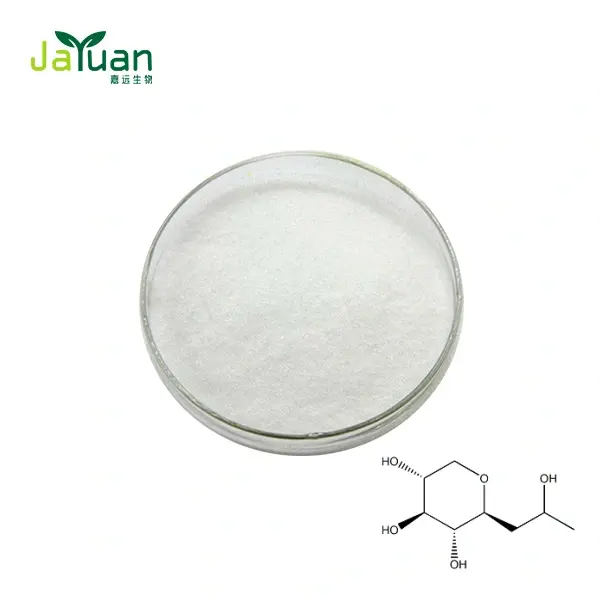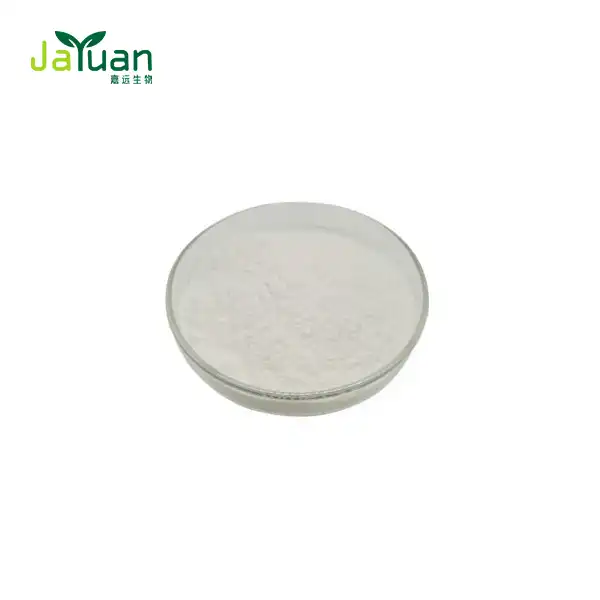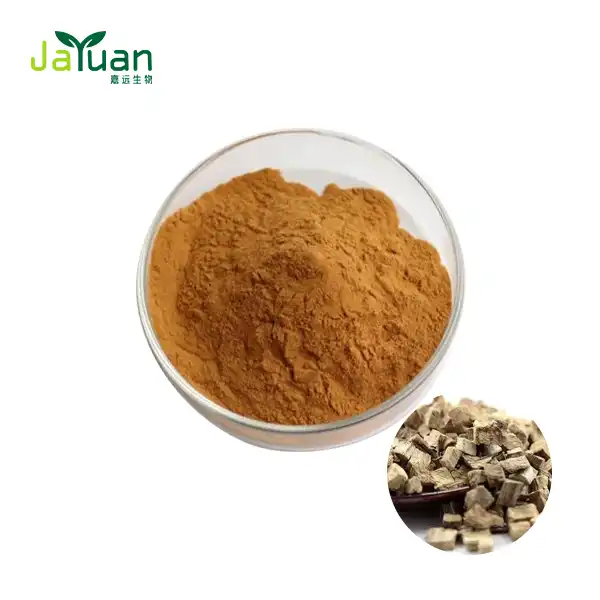Cost-Effectiveness: Cytisine vs. Other Smoking Cessation Aids
Quitting smoking is a challenging journey, but it's one that can significantly improve your health and quality of life. While there are numerous smoking cessation aids available, finding an effective and affordable option can be daunting. In recent years, cytisine supplement has gained attention as a promising and cost-effective alternative to traditional smoking cessation methods. This blog post will explore the cost-effectiveness of cytisine compared to other popular smoking cessation aids, helping you make an informed decision about your quit-smoking journey.

Product Name: Cytisine
CAS NO.: 485-35-8
Molecular formula: C11H14N20
Molecular weight: 190.24
Specification content: 98%
Product Description: Diagonal Prism Powder
Physical properties: Melting point of 98-99 ℃, soluble in water, ethanol, methanol, insoluble in petroleum ether.
Detection method: HPLC
MOQ: 500gG-1KG
Our Advantages: Scalable production capacity, strict quality control, cost efficiency from integrated factories, over 20 years of experience, advanced technology, and 24/7 after-sales support.
Certificaions: FSSC2000/ISO2000/HALAL/KOSHER/HACCP
Delivery terms: FedEx, DHL, EMS, UPS, TNT, all kinds of the airline, international shipping companies.
Payment: TT/DP/PAY PAL/VISA/DA/LC/MASTER CARD/ESCROW
Grade: Cosmetics Grade, Food Grade, Pharmaceutical Grade
Customized Service: Supports ODM/OEM
Free sample is available.
We do not sell retail quantities to individuals.
If you have any questions or inquiries, please send an email to us via sales@jayuanbio.com and sales1@jayuanbio.com for more details! We’ll try our best to give you a better service.
Looking forward to your feedback!
Your immediate reply would be greatly appreciated!
Comparing Cytisine's Price to Nicotine Patches
When it comes to smoking cessation aids, nicotine patches are often the go-to choice for many smokers. However, the cost of these patches can add up quickly, especially for those who require longer treatment periods. Let's take a closer look at how cytisine stacks up against nicotine patches in terms of price and effectiveness.
Price Comparison: Cytisine vs. Nicotine Patches
Cytisine, available as a cytisine supplement, is significantly more affordable than nicotine patches. On average, a full course of cytisine treatment costs about one-tenth of what you'd spend on nicotine replacement therapy (NRT) products like patches. This substantial price difference makes cytisine an attractive option for those looking to quit smoking without breaking the bank.
Effectiveness and Duration of Treatment
While price is an important factor, effectiveness is equally crucial when choosing a smoking cessation aid. Studies have shown that cytisine is at least as effective as nicotine patches in helping smokers quit. In fact, some research suggests that cytisine may be even more effective than NRT products.
Moreover, the duration of treatment with cytisine is typically shorter than that of nicotine patches. A standard cytisine regimen lasts about 25 days, whereas nicotine patch therapy often extends for 8-12 weeks or longer. This shorter treatment period not only reduces overall costs but also minimizes the risk of prolonged dependence on smoking cessation aids.
Long-term Savings: Cytisine vs. Prescription Medications
While over-the-counter options like nicotine patches are popular, many smokers turn to prescription medications for additional support. Let's examine how cytisine compares to these medications in terms of long-term cost-effectiveness.
Cytisine vs. Varenicline: A Cost Comparison
Varenicline, sold under the brand name Chantix, is a commonly prescribed medication for smoking cessation. However, it comes with a hefty price tag. A typical 12-week course of varenicline can cost several hundred dollars, even with insurance coverage.
In contrast, a full course of cytisine treatment is significantly less expensive. When considering the potential for multiple quit attempts, the cost savings of choosing cytisine over varenicline can be substantial over time.
Efficacy and Side Effect Profile
Studies have shown that cytisine's efficacy is comparable to that of varenicline. Both medications work by targeting nicotinic acetylcholine receptors in the brain, reducing cravings and withdrawal symptoms. However, cytisine supplement has been used for decades in Eastern Europe and has a well-established safety profile.
Varenicline, while effective, has been associated with a higher incidence of side effects, including nausea, sleep disturbances, and mood changes. These side effects can lead to discontinuation of treatment, potentially reducing its overall effectiveness and value for money.
Long-term Economic Benefits
When evaluating the cost-effectiveness of smoking cessation aids, it's essential to consider the long-term economic benefits. Successful smoking cessation not only saves money on cigarettes but also reduces healthcare costs associated with smoking-related illnesses.
Given its lower upfront cost and comparable efficacy, cytisine offers an excellent return on investment for those looking to quit smoking. The money saved by choosing cytisine over more expensive options can be substantial, especially when factoring in the potential need for multiple quit attempts.
Is Cytisine Covered by Health Insurance?
As the popularity of cytisine grows, many smokers wonder about its coverage under health insurance plans. Let's explore the current status of cytisine coverage and what it means for those seeking an affordable smoking cessation option.
Current Insurance Coverage Status
At present, cytisine is not widely covered by health insurance plans in many countries, including the United States. This is primarily because it has not yet received FDA approval as a smoking cessation aid. However, the situation is evolving, and coverage may expand in the future as more research supports cytisine's efficacy and cost-effectiveness.
Out-of-Pocket Costs and Accessibility
Despite the lack of widespread insurance coverage, the low cost of cytisine makes it an accessible option for many smokers. Even without insurance, the out-of-pocket expense for a full course of cytisine treatment is often lower than the copayments required for other prescription smoking cessation medications.
For those seeking a cytisine supplier, it's important to note that while the supplement is not widely available in traditional pharmacies, it can be purchased from reputable online suppliers. Always ensure you're buying from a trusted source to guarantee the quality and safety of the product.
Advocacy for Expanded Coverage
As awareness of cytisine's benefits grows, there's increasing advocacy for its inclusion in smoking cessation programs and insurance coverage. Healthcare professionals and policymakers are recognizing the potential of cytisine to improve public health outcomes while reducing healthcare costs associated with smoking.
If you're interested in using cytisine as part of your smoking cessation plan, consider discussing it with your healthcare provider. They may be able to provide guidance on obtaining cytisine or advocate for its coverage under your insurance plan.
Alternative Funding Options
For those without insurance coverage for cytisine, there are alternative ways to make the treatment more affordable:
- Flexible Spending Accounts (FSAs) or Health Savings Accounts (HSAs): These accounts allow you to use pre-tax dollars for health-related expenses, potentially including smoking cessation aids like cytisine.
- Smoking Cessation Programs: Some employers or community organizations offer smoking cessation programs that may cover or subsidize the cost of cytisine.
- Clinical Trials: Participating in clinical trials studying cytisine may provide access to the supplement at no cost, while also contributing to research in this field.
The Future of Cytisine Coverage
As more research emerges supporting the efficacy and cost-effectiveness of cytisine, it's likely that insurance coverage will expand. This could make cytisine an even more accessible option for smokers looking to quit, potentially revolutionizing smoking cessation efforts worldwide.
In the meantime, the relatively low cost of cytisine compared to other smoking cessation aids makes it a viable option for many, even without insurance coverage. The potential health benefits and long-term cost savings of quitting smoking far outweigh the initial investment in cytisine treatment.
Conclusion
When it comes to quitting smoking, finding an effective and affordable solution is crucial. Cytisine emerges as a compelling option, offering a unique combination of efficacy, safety, and cost-effectiveness. While it may not be covered by insurance in many regions, its low price point makes it accessible to a wide range of smokers seeking to break free from nicotine addiction.
Compared to nicotine patches and prescription medications like varenicline, cytisine offers significant cost savings without compromising on effectiveness. Its shorter treatment duration and well-established safety profile further enhance its appeal as a smoking cessation aid.
As awareness of cytisine grows, it's likely that we'll see increased advocacy for its wider availability and potential insurance coverage. In the meantime, those interested in using cytisine as part of their quit-smoking journey should consult with healthcare professionals and explore reputable cytisine suppliers.
Remember, the journey to quit smoking is personal, and what works best may vary from person to person. However, for those seeking a cost-effective option with proven efficacy, cytisine presents a promising path towards a smoke-free life.
If you're considering cytisine as part of your smoking cessation plan, or if you have any questions about our cytisine supplement, we're here to help. Contact us at sales@jayuanbio.com or sales1@jayuanbio.com for more information on our high-quality cytisine products and how they can support your journey to a healthier, smoke-free life.
References
1. Walker, N., et al. (2014). Cytisine versus nicotine for smoking cessation. New England Journal of Medicine, 371(25), 2353-2362.
2. Hajek, P., et al. (2019). A randomized trial of e-cigarettes versus nicotine-replacement therapy. New England Journal of Medicine, 380(7), 629-637.
3. Cahill, K., et al. (2016). Pharmacological interventions for smoking cessation: an overview and network meta-analysis. Cochrane Database of Systematic Reviews, (5).
4. West, R., et al. (2011). Placebo-controlled trial of cytisine for smoking cessation. New England Journal of Medicine, 365(13), 1193-1200.
5. Leaviss, J., et al. (2014). What is the clinical effectiveness and cost-effectiveness of cytisine compared with varenicline for smoking cessation? A systematic review and economic evaluation. Health Technology Assessment, 18(33), 1-120.
6. Beard, E., et al. (2016). New pharmacological agents to aid smoking cessation and tobacco harm reduction: What has been investigated, and what is in the pipeline? CNS Drugs, 30(10), 951-983.

